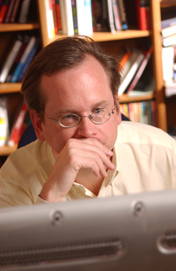Freedom for IP Goals for 2008
2. We would like to add a section on FFIP for videos while experimenting with a monthly video cast on current issue related to IP. My personal strength is public speaking, and I want to try capturing that for an online medium.
3. Move from Blogger to WordPress - Blogger has served us well but does not fit our mission. Open source community based tools represent the values of FFIP better. Both Sarah and Brian have transitioned to WordPress for our personal blogs and the process has been very positive.
4. Improve Case Law and Philosophy sections - We need to add cases like KSR International v. Teleflex, INS v. AP, and Michael Savage v. CAIR. We have decided not to internally host a case law database, but instead to link to outside resources like AltLaw and Wikipedia while adding our own comments and resources on the FFIP site. On the philosophy side we need to add Wealth of Networks, Infringement Nation and a pleathera of other writings on the topics to the list. We may even start a wiki to take suggestions for resources to add.
5. More Partnerships - Last year we worked with Defective By Design, CC and EFF with great success. Defective by Design runs the best protests while CC and EFF have been extremely useful for providing educational materials for teaching people about their rights and options to opt out of copyright. We will be reaching out to more organizations to help educate more people about the need to expand Fair Use and reform patents.
6. New logo - *holds head in hands* this is long over due. I fail at graphic design. I can give public speeches, code and even write Fair Use defense legal letters, but when it comes to artistic online skillz we need help. We need a new logo.
I should stop here before going making the list too long... These goals are manageable and can be accomplished with your help.
FFIP has been running for two and a half years now, I am grateful for all the help we have had from law professors, other orgs and volunteers. I look forward to another year bring the copyfight to the people who will fight for our rights in the digital age.
Labels: 2008, CC, EFF, FFIP, Michael Savage







